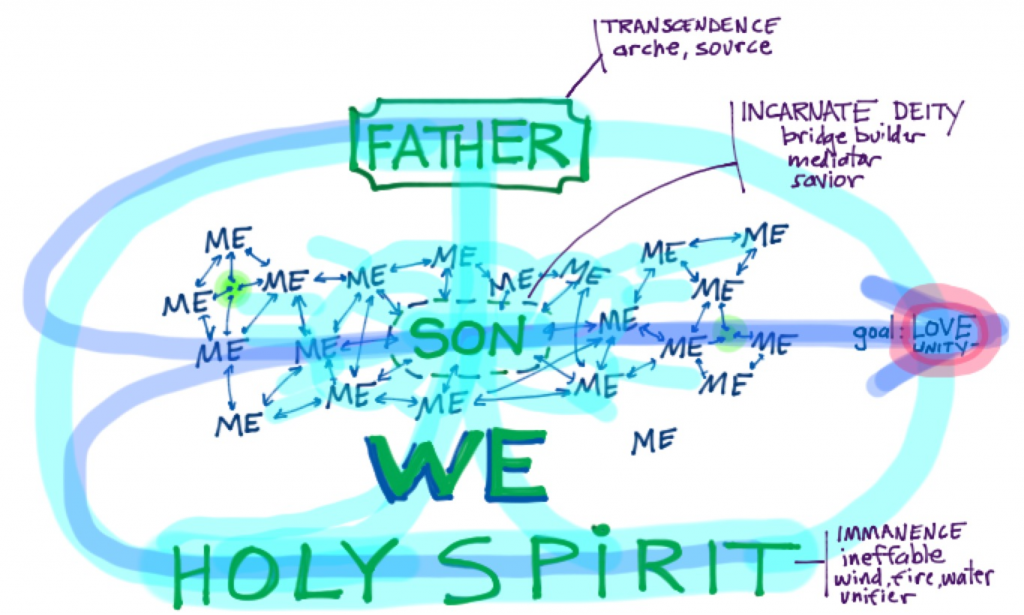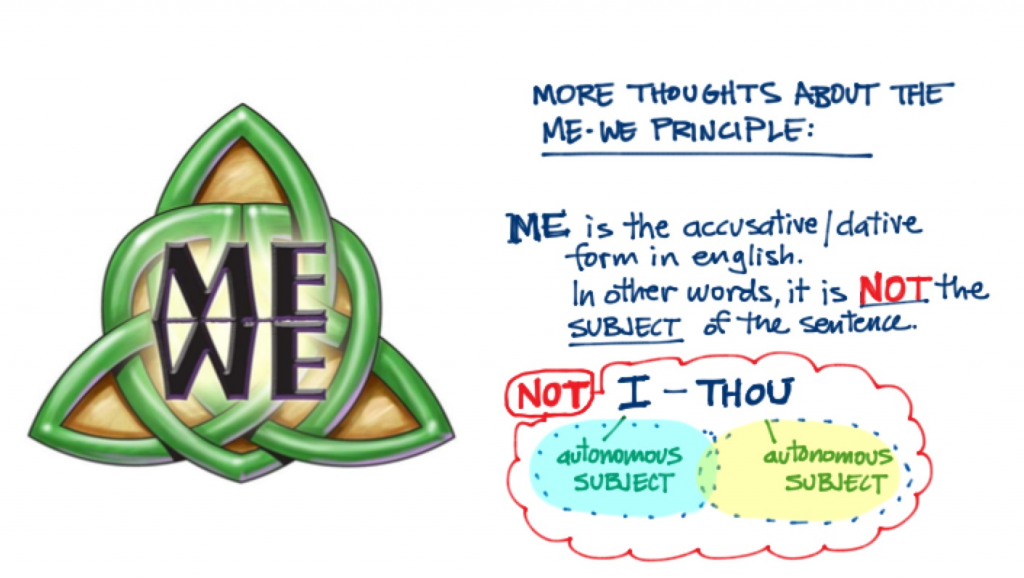I drew these sketches and wrote these words in August, 2012:


There is no I in this picture. The subject is not in the singular. God is inherently WE in God’s Trinitarian essence. Father, Son, and Holy Spirit collectively form the subject WE. God said, “We create humanity in our image, male and female we create them.”
The individual self is not the subject at all, but always in the accusative or dative form ME. We–the collective me’s, that is–have our being because we receive it from another. God creates me. You, fellow human, know me, love me, hate me, help me, hurt me. In the reception of the action the me is formed, for good or for evil.
The great illusion is that I am the subject. Yes there is a part that I play in this picture. I am one of the many me’s, and you cannot receive my love without me functioning as an I. However, I cannot function as an I without first having been the me that received life and love from God and from primary humans around me.
Sin, idolatry, separation, and destruction begins when I believe that I am without any prior me-ness, or that I am not worthy of receiving your love. The autonomous, individual I that acts upon the objective world is a deception that has led to a great amount of suffering, and the dejected withdrawn I is a darkness that infects us all.
I am only me because of the ultimate and sustaining We that loves me and calls me to love others.
The telos–end goal, aim, objective, purpose–of this picture is love. God loves all creation and longs to draw all creation into reciprocal love in which individual me‘s all realize our interdependence and ultimate source and learn to live in the way of God’s communicative reality. This is what we often call the Kingdom of God…on earth as it is in Heaven. ((from my noteshelf app on the iPad, August 12, 2012))
It is almost two years later and, looking back on this statement, I realize two things:
- I still agree with it. That is a good sign that this thought has been a connective tissue throughout my PhD process. I need to listen to that and should probably incorporate it at some level in my dissertation.
- I now have good research to give warrant to this statement. Below is a rough sketch of warrants for my argument.
- Simpson: No Trinity, No Mission
- George Herbert Mead: I and Me
- Martin Buber and Levinas on I-Thou and Facing each other from Communicative Theology
- Kegan’s 5th Order of Consciousness
- Charles Taylor – The Buffered Self vs. the Porous Self
- Neuroscience and Spirituality – the brain’s compulsion to create the I, especially as it is reinforced by Western Society. Spirituality’s telos is to connect to the whole. Top Down vs. Bottom up brain function.
- Conn, Fowler, Groome: Christian Conversion is about self-transcendence and Shared Praxis. epistemic ontology, Agent-Subjects-in-Relationship
- Habermas – Brookfield– Palmer – Hess: Communicative Rationality and Adult Learning
- Entangled Trinity: Simmons, Zizioulas, Polkinghorne: Relational Ontology
- Welker – God the Spirit – pluriform and polycentric
- Husserl – Willard: Bracketed Reality
- Gadamer: fusion of horizons
- Block: community – methodology for listening and empowering
- Wheatley: open systems, social networks and chaos theory in leadership and organizational theory
- The Third Way of postfoundationalism: Grenz and Franke, Shults
- Kiefert: Welcoming the Stranger. Listening to God in the Word and in the World
- Simpson: Prophetic Public Companions
- Kelsey: To Understand God Truly – knowing God through secondary observation of the movement in congregations…in society…in the other.
- The Essence of the Church: Van Gelder – the is, the church does what it is, the church organizes what it does, the church either conretizes its organization and the Spirit blows it up, or the church moves with the spirit to adapt and change the organization.
- Hiebert: bounded and centered sets
- Sheldrake: Public Interiority


Trackbacks/Pingbacks